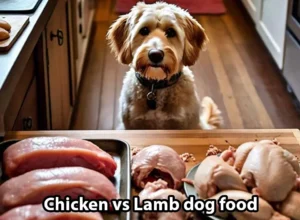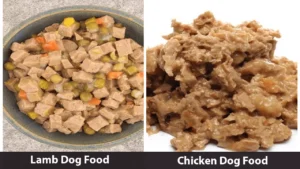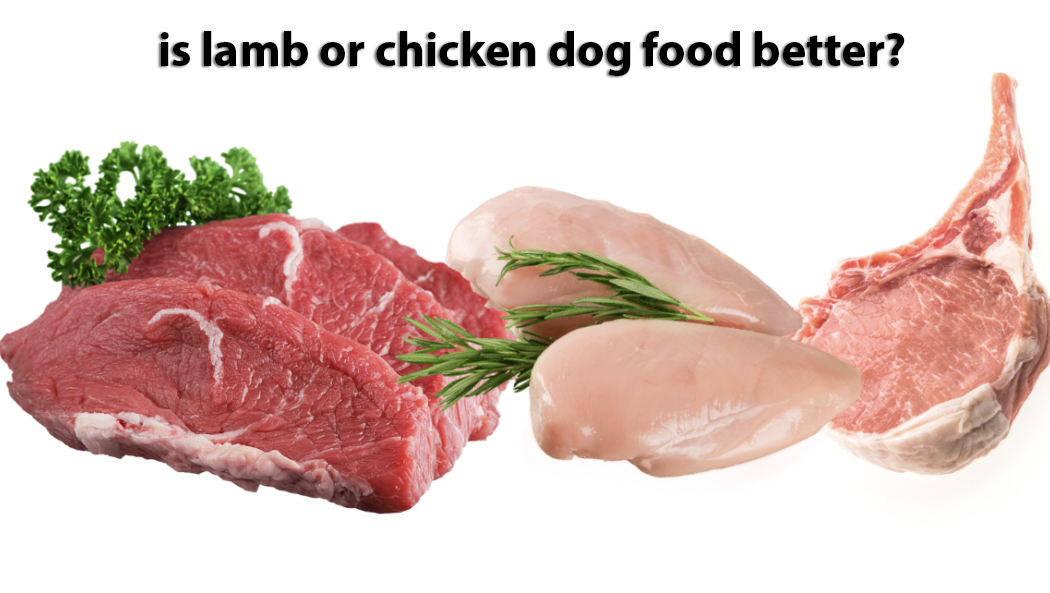Choosing between lamb or chicken dog food can be tough. As a dog owner, I know how important it is to pick the right food for our pets. It’s not always clear whether lamb or chicken dog food is better. I’ve had my own experience trying both for my dog, and I’ve learned that the best choice depends on a few key factors. In this article, I’ll help you compare lamb and chicken dog food, using both expert advice and my personal experience. Whether you’re wondering if lamb dog food is better than chicken or debating chicken vs lamb dog food, read on to see which one might be best for your dog.
Nutritional Breakdown of Lamb and Chicken Dog Food
Why is Protein So Important for Dogs?
Protein is essential for your dog’s health. It helps build and repair muscles and tissues. It also provides energy. Without enough protein, dogs can feel weak or tired. Choosing the right protein helps keep your dog strong and healthy. When picking dog food, make sure it has high-quality protein to support your dog’s health.
Lamb Dog Food: What Makes It a Great Choice?
Lamb is a great source of protein. It helps dogs build muscle and gives them energy. Lamb also has Omega-3 fatty acids, which are good for the skin and coat. It has Vitamin B12, which helps with nerve and blood health. Zinc in lamb supports the immune system and healing. Lamb also has more fat, which is good for active dogs who need extra energy. I’ve seen how my friend’s active dog stayed strong and healthy on lamb-based food.
Chicken Dog Food: A Lean and Digestible Protein Source
Chicken is lean and easy to digest. It’s great for dogs who need to manage their weight or are less active. Chicken provides vitamins B3 and B6, which help with energy. It also has omega fatty acids for healthy skin. For dogs with sensitive stomachs, chicken is gentle and easy on their digestive system. I’ve experienced this with my own dog, who had a sensitive stomach. Once we switched to chicken, she felt much better after meals.

Lamb vs. Chicken: Key Differences in Their Health Benefits
Fat Content – Which One is Better for Your Dog’s Weight?
Lamb has more fat than chicken, which is good for active dogs. The extra fat gives them the energy they need to stay active. But if your dog is less active or tends to gain weight, chicken might be a better choice. I had a friend whose dog struggled with weight. They switched to chicken, and the dog’s weight became easier to manage. Chicken’s leaner protein makes it perfect for dogs that need to stay fit.
Allergies and Sensitivities – Which Protein Is More Allergen-Free?
Both lamb and chicken are usually safe, but some dogs are allergic to chicken. If your dog has a chicken allergy, lamb can be a good choice. I’ve seen this with a dog in my family who developed an allergy to chicken. After switching to lamb, the allergy symptoms went away. Lamb is less likely to cause allergies, so it’s a safer bet for sensitive dogs.
Energy Levels – Which Protein Is Right for Active Dogs?
Lamb is richer in fat, which helps active dogs stay energetic. If your dog loves to run and play, lamb can provide the energy they need. I’ve cared for an active dog who thrived on lamb. He had more energy and recovered quicker after playtime. If your dog is older or more relaxed, chicken might be better. It’s lower in fat, which helps keep their weight in check and supports digestion.
Taste and Preference – Which Protein Do Dogs Prefer?
Does Your Dog Have a Preference Between Lamb and Chicken?
Dogs can be picky about their food, just like us! Some dogs love the smell of lamb, while others prefer chicken. I’ve seen this with my dog. She loves lamb. The smell seems to excite her, and she eats it much faster than chicken. Chicken, on the other hand, is milder in taste and scent.
One of my neighbors has a dog who usually turns his nose up at food. But when we switched him to lamb-based food, it was like a miracle! As soon as he smelled it, he ate the whole bowl in minutes. If your dog is picky, lamb might be the way to go. Its strong smell could make mealtime more exciting.
Price and Accessibility – Which Option is More Budget-Friendly?
How Does the Cost of Lamb and Chicken Compare?
When choosing between lamb and chicken dog food, cost is an important factor. Chicken-based food is usually more affordable. It’s widely available and cheaper to produce. On the other hand, lamb is often more expensive. It’s less common and usually costs more because it comes from specific regions.
I’ve found that feeding my dog chicken was much easier on the budget. Lamb was great, but it was harder to keep up with the higher price. If you’re on a tight budget, chicken might be the better choice. But if your dog has special needs or allergies, lamb might be worth the extra cost.

How to Choose Between Lamb and Chicken for Your Dog
Consider Your Dog’s Age, Activity Level, and Health Needs
Choosing between lamb and chicken depends on your dog’s age, activity level, and health. If you have an older dog, chicken might be the better choice because it’s lean and easy to digest. For active dogs, lamb can be great since it has more fat and provides extra energy.
I remember my friend’s senior dog had trouble with weight and digestion. After talking to the vet, they switched to chicken-based food. It helped him maintain a healthy weight and feel better. In contrast, a lively dog I know did really well on lamb. The extra energy it provided kept him active and happy.
Consult Your Veterinarian for Tailored Advice
If you’re not sure which food is right for your dog, ask your vet. They can help you choose the best food based on your dog’s health and needs.
For example, when my dog had a sensitive stomach, the vet suggested chicken-based food. After making the switch, she felt much better. A vet can give you the best advice to meet your dog’s specific health needs.
Frequently Asked Questions (FAQs)
- Is lamb or chicken better for dogs with food allergies?
Some dogs may be allergic to chicken, causing issues like itching or stomach problems. Chicken is a common allergen. Lamb, on the other hand, is often less likely to cause allergies and is considered hypoallergenic. If your dog has food sensitivities, lamb might be a better choice. I’ve seen a dog’s allergy symptoms disappear after switching to lamb.
- Can I mix lamb and chicken in my dog’s diet?
Yes, you can mix lamb and chicken in your dog’s meals. Many pet owners rotate proteins to give their dog variety and balance. Mixing both can also provide different health benefits. For example, lamb’s higher fat helps with energy, while chicken is easier to digest. When I switched between lamb and chicken for my dog, she enjoyed the change and seemed more excited for mealtime.
- Which is better for senior dogs, lamb or chicken?
For senior dogs, chicken is usually the better choice. It’s lean and easy to digest, making it great for dogs with slower metabolisms. Chicken can help with weight control too. However, if your senior dog is still very active, lamb might be a good option because of its extra energy. I had an older dog who had trouble with weight, so we switched to chicken, and it helped him stay healthy.
- Can lamb dog food cause weight gain?
Lamb has more fat than chicken, which can cause weight gain in dogs that are not very active. If your dog isn’t as active or is prone to gaining weight, chicken might be the better choice. But if your dog is active and burns more energy, lamb could be a great option. I have a neighbor whose dog loves to run, and she does great on lamb-based food, without gaining extra weight.
Conclusion: Which Protein Source is Best for Your Dog?
Choosing between lamb and chicken dog food is not easy. There is no perfect answer. It depends on your dog’s needs. Active dogs may do better with lamb. It has more fat and provides extra energy. For less active dogs, chicken is a better choice. It’s leaner and helps with weight control.
If your dog has allergies, lamb might be the better choice. Chicken can cause reactions in some dogs. Always pay attention to how your dog reacts to food.
Consult your vet if you’re unsure. They can guide you based on your dog’s age, health, and activity level. You can also try both proteins and see which works best for your dog.
Above all, the goal is to keep your dog happy and healthy
